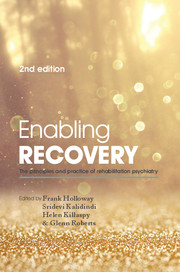Book contents
- Frontmatter
- Contents
- List of contributors
- List of figures, tables and boxes
- Preface
- Part 1 Setting the scene
- 1 Rehabilitation in a historical context
- 2 What is psychiatric rehabilitation?
- 3 Rehabilitation as a values-led practice: the contribution of recovery, social inclusion and personalisation
- 4 A comprehensive approach to assessment in rehabilitation settings
- 5 Understanding madness: a psychosocial perspective
- 6 First-person narratives
- Part 2 Treatment approaches
- Part 3 Key elements of a rehabilitation service
- Part 4 Special topics in psychiatric rehabilitation
- Part 5 Future directions
- Index
2 - What is psychiatric rehabilitation?
from Part 1 - Setting the scene
Published online by Cambridge University Press: 02 January 2018
- Frontmatter
- Contents
- List of contributors
- List of figures, tables and boxes
- Preface
- Part 1 Setting the scene
- 1 Rehabilitation in a historical context
- 2 What is psychiatric rehabilitation?
- 3 Rehabilitation as a values-led practice: the contribution of recovery, social inclusion and personalisation
- 4 A comprehensive approach to assessment in rehabilitation settings
- 5 Understanding madness: a psychosocial perspective
- 6 First-person narratives
- Part 2 Treatment approaches
- Part 3 Key elements of a rehabilitation service
- Part 4 Special topics in psychiatric rehabilitation
- Part 5 Future directions
- Index
Summary
Introduction
Rehabilitation is defined by the World Health Organization (1980) as the application of measures aimed at reducing the impact of disabling and handicapping conditions and enabling people with a disability to achieve social integration. Implicit in this definition are two components: first, an active process through which a person adapts or acquires the skills needed to mitigate the constraints of disease; and second, an acknowledgement that there may also need to be changes in the environment, including the attitudes of people without a disability, if optimal social integration is to be achieved.
For William Anthony, product champion of psychiatric rehabilitation in the USA, rehabilitation involves ‘improving the psychiatrically disturbed person's capabilities and competence’ by bringing about ‘behavioural improvement in their environment of need’ (Anthony et al, 1984: 140). In subtle contrast, Douglas Bennett (1978), whose views strongly influenced UK practice, emphasised helping individuals adapt to their deficits in personal skills by ‘making best use of [their] residual abilities in order to function in as normal environment as possible’.
Psychiatric rehabilitation is frequently defined as the activity of a set of specialist services. an alternative formulation would be in terms of the needs or characteristics of people who would benefit from rehabilitation inputs. wykes & holloway (2000) defined the potential client group as people with severe and long-term mental illnesses who have both active symptomatology and impaired social functioning as a consequence of their mental illness. from this definition they argued that rehabilitation services should have the joint aims of minimising the symptoms of illness and promoting the social inclusion of clients.
Recent years have seen a growing focus on mental health rehabilitation in the UK. Killaspy et al (2005) collated responses from rehabilitation practitioners into a contemporary definition:
A whole systems approach to recovery from mental illness that maximises an individual's quality of life and social inclusion by encouraging their skills, promoting independence and autonomy in order to give them hope for the future and leads to successful community living through appropriate support (p. 163).
- Type
- Chapter
- Information
- Enabling Recovery , pp. 18 - 38Publisher: Royal College of PsychiatristsPrint publication year: 2015



